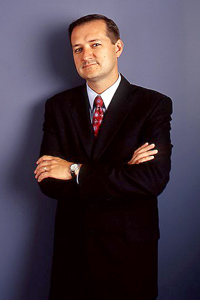Chicago In the News
The Chronicle’s biweekly column Chicago In the News offers a digest of commentary and quotations by a few of the University faculty members, students and alumni who have been headlining the news in recent weeks. Chicago faculty members are some of the most frequently quoted experts, so space allows publishing references to only selected examples. To read many of the full newspaper articles mentioned in this column, visit the University News Office Web site: http://news.uchicago.edu.
Chef to keep cooking for Obamas
Alumnus Sam Kass (A.B.,’04), the Obamas’ private chef while they lived in Chicago, is following them to the White House. Kass, a Chicago native and former Lab School graduate, founded Inevitable Table, a private chef service in Chicago that promotes a “link to clean, healthy food” by shopping from local farms and small, sustainable wineries. Kass hopes to address the environment and Americans’ poor eating habits. “Not only is there an unconscionable amount of people who remain hungry,” said Kass, “there’s even a larger population, mostly poor, who are faced with obesity, diabetes and various other problems from overabundance.” Kass was featured in The New York Times and Associated Press news service.
 Tom Ricketts |
|
Alum leads bid to buy Cubs
The Thursday, Jan. 22 Chicago Tribune reported that the family of alumnus Tom Ricketts (A.B.,’88, M.B.A.,’93) had secured exclusive negotiating rights to acquire the Chicago Cubs. As a University student, Ricketts lived in an apartment across from Wrigley Field. “My family and I are Cubs fans,” he said in a statement. “We share the goal of Cubs fans everywhere to win a World Series and build the consistent championship tradition that fans deserve.” Ricketts is the chief executive of Incapital, an investment bank in Chicago, while the Ricketts family founded TD Ameritrade, an online discount brokerage. The winning bid reportedly was worth $900 million.
Bank plan won’t tax public
Luigi Zingales, the Robert C. McCormack Professor of Entrepreneurship and Finance at Chicago Booth, believes he has a way to rescue banks without costing taxpayers. He proposes splitting banks into two entities—a “bad bank” with souring assets and a “good bank” that can lend normally. The concept is similar to the “bad bank” idea, which the Obama team has been talking about, except that Zingales’ plan would allocate bank ownership to stockholders and bondholders—creating some legal headaches but spreading some of the burden of bad assets to bondholders. “(The banks) really want this stuff off their balance sheets at taxpayers’ expense,” Zingales said. “I don’t blame them. If you have an idiot who pays for your mistakes, why not?” Zingales spoke about his economic plan in Reuters news wires, Fortune and the Chicago Tribune.
Study: Patients forget their doctors
University researchers found that hospital patients are rarely able to identify their doctors by name or describe their roles in the care-taking process, according to a Friday, Jan. 30 article in The New York Times. The study included interviews of 2,807 adults admitted to the school’s hospital over a 15-month period. About 75 percent of patients were unable to name a doctor assigned to their care while of the 25 percent that could provide a name, only 40 percent were correct. “I was not so surprised,” said Vineet Arora, Assistant Dean for Curricular Innovation in the Pritzker School of Medicine, noting the frenetic nature of a hospital. “Caregivers aren’t always there, especially late at night and early in the morning.” The study found that patients able to name one of their physicians also were more likely to be unsatisfied with their care.
Slumdog: A fair portrayal of India?
The movie Slumdog Millionaire has garnered its share of praise, including 10 Oscar nominations, as well as criticism for its stereotypical depiction of India as a place of squalor, poverty and corruption. An article in the Saturday, Jan. 24 Los Angeles Times stated that many believe the film’s international success is the result of themes that resonate with Western audiences, especially in the wake of the terror attacks in Mumbai, where the film is set. “A lot of people felt it was bashing India, but I disagree,” said Rochona Majumdar, Assistant Professor in South Asian Languages & Civilization, an Indian film expert. “We’re too quick to celebrate ‘Incredible India’ (in reference to the tourism slogan), but there is an underbelly. To say we don’t have problems is absurd.”
Economists tackle NFL earnings
A pair of economists at Chicago Booth completed a study for the National Football League Players Association, which found that teams earned about $25 million last year and more than quadrupled in value from 1998 to 2008. Kevin Murphy, the George J. Stigler Distinguished Service Professor in Economics at Chicago Booth, and Robert Topel, the Isidore Brown & Gladys J. Brown Professor in Urban & Labor Economics at Booth, were commissioned for the study, as the union and league approach contract talks. The study found that franchises had risen in value from $288 million to $1.04 billion in the 10-year span. “NFL team ownership has consistently yielded a better overall return than a typical investment in the U.S. economy,” the authors wrote. The story appeared in the Chicago Sun-Times and Bloomberg news wires.
Obama in position of power
Geoffrey Stone, the Edward H. Levi Distinguished Service Professor in the Law School and the College, noted President Bush’s expansion of executive power, in a Tuesday, Jan. 27 article in Bloomberg news wires. Stone noted that President Obama inherits much more power than his predecessor, who took the reins of government in the wake of the Sept. 11 attacks. Obama now has more leeway to govern than any former president, thanks in part to Bush’s “over-claiming” of power. “The essence of the executive power claim is that certain authority is implicitly designated to the executive branch that may not be second-guessed by Congress, or even possibly the courts,” Stone said.
![[Chronicle]](/images/sidebar_header_oct06.gif)